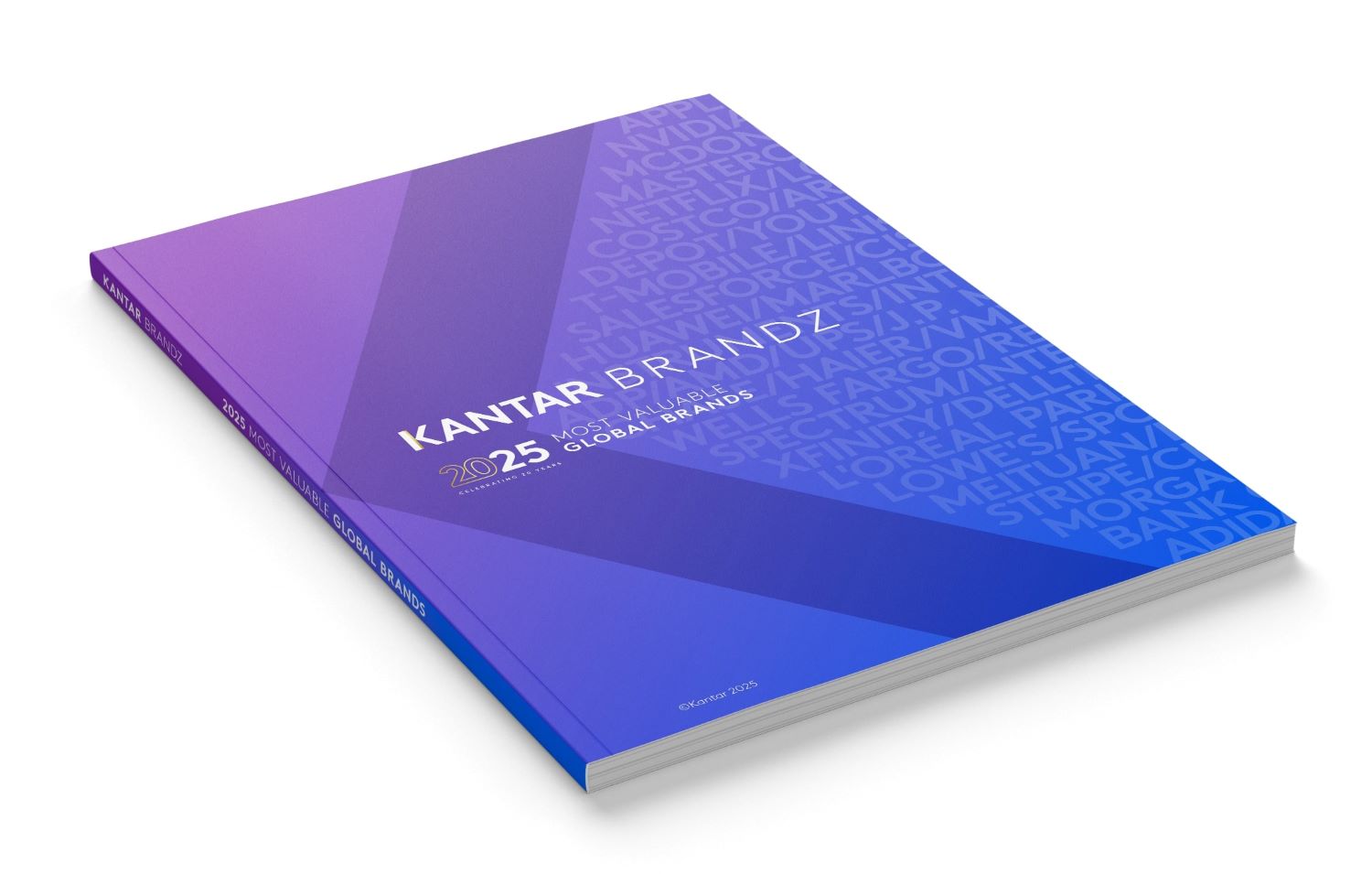The 2025 report reveals the total value of China’s Top 100 brands increased 25% over the past year to reach a combined value of $1.2 trillion. 68 brands in the Top 100 increased in brand value, twice as many as in 2024. This strong performance after a challenging period is credited to AI innovation, strong financial services, overseas expansion and the rebound of China’s technology titans.
The Top 10 Most Valuable Chinese Brands of the Year
With a brand value of $198 billion, Tencent retains its position as China’s most valuable brand for the fifth consecutive year. Tencent’s 53% year-on-year brand growth reflects its ability to scale both consumer-facing platforms and B2B services, driven by innovation across video, music, gaming, advertising and AI-powered solutions.
Alibaba reclaims the No.2 spot in Kantar BrandZ’s China Top 100, with its brand value rising 23% to $84.4 billion. Moutai follows closely at No.3 with $80.0 billion, maintaining its position as China’s leading alcohol brand. Douyin holds steady at No.4, growing 34% to $76.2 billion, while Huawei retains fifth place with a 56% surge to $64.2 billion, making it the fourth fastest riser in the ranking. At No.6, Haier ($47.8 billion) continues to lead in the IoT ecosystem category, strengthening its brand through strategic co-creation with end-users and AI-driven innovation.
Kantar BrandZ Top 10 Most Valuable Chinese Brands 2025
| 2025 Rank | Brand | Category | Brand Value (US$M) |
| 1 | Tencent | Business Technology and Services Platforms / Media and Entertainment | 197,991 |
| 2 | Alibaba | Retail | 84,352 |
| 3 | Moutai | Alcohol | 80,023 |
| 4 | Douyin | Media and Entertainment | 76,200 |
| 5 | Huawei | Consumer Technology and Services Platforms | 64,152 |
| 6 | Haier | IoT Ecosystem | 47,769 |
| 7 | China Mobile | Telecom Providers | 41,078 |
| 8 | ICBC | Financial Services | 38,302 |
| 9 | Ping An | Financial Services | 29,640 |
| 10 | Meituan | Consumer Technology and Services Platforms | 29,328 |
In today’s volatile global landscape, it is not enough to be known, brands must be known for something that truly matters. Chinese marketers must focus on creating brands that are emotionally resonant, functionally superior and culturally relevant. This means investing in AI-powered consumer insights, embracing co-creation with users and crafting high-quality experiences that exceed expectations. Whether it’s Haier’s AI-driven home appliances or Xiaomi’s ‘Human x Car x Home’ ecosystem, the brands that thrive are those that connect deeply with people’s lives. At Kantar, we believe that Meaningful Difference isn’t just a metric, it’s a mindset. It’s the key to unlocking sustainable brand growth both at home and abroad.
Newcomers and re-entries
This year’s Top 100 ranking welcomed three newcomers and four re-entries, reflecting the growing diversity and agility of China’s brand landscape. Fast food emerged as a standout category, with Mixue Bingcheng (No.51; $4.0bn) leading the new entrants thanks to its freshly made tea, cost-effective supply chain and strong brand identity for its affordable drinks. Chagee (No.88; $1.8bn) focused on the social aspects of tea-drinking, while introducing Chinese culture and oriental aesthetics to consumers around the world. Among the re-entries, Qunar.com (No.78; $2.2bn) returned to the ranking by enhancing its online travel platform with advanced search tools and competitive packages.
Kantar BrandZ China Top 100 2025: Newcomers and Re-entrants
| 2025 Rank | Brand | Category | Brand Value (US$M) | New/Re-entry |
| 51 | Mixue Bingcheng | Fast Food | 3,955 | New |
| 61 | Freshippo | Retail | 3,008 | New |
| 78 | Qunar.com | Travel Services | 2,204 | Re-entry |
| 80 | XPENG | Automotive | 2,175 | Re-entry |
| 88 | Chagee | Fast Food | 1,817 | New |
| 93 | NCI | Financial Services | 1,684 | Re-entry |
| 98 | Dong E E Jiao | Health Care | 1,500 | Re-entry |
Top Risers
Over the year, China’s fastest-growing brands averaged a 67% growth rate, led by Xiaomi (No.11; $28.2bn), which soared 154% by aligning its product ecosystem with evolving consumer lifestyles. Eastroc Beverage (No.44; $4.2bn), demonstrated how traditional industries can transform themselves, further cementing its position as a nationally recognised brand.
Kantar BrandZ China Top 100 2025: Top 10 Risers
| Brand | Category | Brand Value (US$M) | Brand Value Change 2025 vs 2024 |
| Xiaomi | Consumer Technology and Services Platforms | 28,150 | 154% |
| BYD | Automotive | 17,164 | 78% |
| Eastroc Beverage | Food and Beverages | 4,218 | 73% |
| Huawei | Consumer Technology and Services Platforms | 64,152 | 56% |
| Meituan | Consumer Technology and Services Platforms | 29,328 | 54% |
| Dianping | Consumer Technology and Services Platforms | 4,077 | 54% |
| Tencent | Business Technology and Services Platforms / Media and Entertainment | 197,991 | 53% |
| Ctrip | Consumer Technology and Services Platforms | 5,586 | 49% |
| bilibili | Media and Entertainment | 3,005 | 49% |
| Haier | IoT Ecosystem | 47,769 | 47% |
My colleague, Sirius Wang, Managing Director of Product & Operations, Kantar Greater China, commented on the results, saying, “Chinese brands are rapidly advancing the frontier of AI adoption, not just in consumer experiences, but across industrial and creative ecosystems. From streamlining manufacturing to transforming branded content and marketing strategy, AI is enabling faster, smarter decision-making. In a highly competitive platform landscape, emerging players like DeepSeek are challenging incumbents. Meanwhile, scenario-based innovations like AI-based household products exemplify how seamlessly intelligent technology is being woven into everyday life.”
Industry highlights
China’s Top 100 ranking spans 20 categories. Media and Entertainment remains at the top, with 11 brands contributing 27% of the ranking’s total brand value, up from 24% last year. Financial Services is second with a 16% value share and the highest number of brands at 16. Consumer Technology and Services Platforms jumped to third place this year from fifth in 2024.
vivo (No.34; $6.0bn), which has remained the top-selling domestic smartphone brand in China's smartphone market for four consecutive years by leveraging user-oriented innovations and becoming the "concert must-have" and "light-office essential", has now also achieved remarkable success in the global market, becoming a highly sought-after brand.
iFLYTEK (No.42; $4.8bn) has accelerated its AI deployment across sectors, championing the principle of ‘Technology for Good’. TCL (No.76; $2.3bn), a key player in the Business Technology and Services Platforms category, secured official status as an Olympic Worldwide Partner this year, continuing its sports marketing strategy that combines building emotional resonance with brand globalisation.
In the automotive sector, the growing demand for sustainable travel and mobility options has fanned the demand for new-energy vehicles. Second fastest riser BYD (No.18; $17.2bn) grew 78%, fuelled by its ongoing innovation in battery technology and strategic partnerships that have expanded its market reach. XPENG (No.80; $2.2bn) launched cutting-edge electric vehicle models with advanced battery technology and intelligent driving features to re-enter the ranking this year.
Other findings from the Kantar BrandZ Most Valuable Chinese Brands report include:
• A stand-out market: China continues to stand out as a high-growth market in the global brand landscape. According to Kantar BrandZ, the top 30 most valuable Chinese brands achieved a growth rate second only to the United States, outpacing major European markets including France, Germany and Italy. These leading Chinese brands also posted the highest average scores for Meaningful Difference, underscoring their ability to combine emotional resonance with distinctiveness in ways that drive long-term brand value
• Being Meaningfully Different matters: Over 60% of the brands in China’s Top 100 are both highly Meaningful and Different - core drivers of brand equity and long-term business success. This proportion far exceeds that of the broader Chinese brand landscape, underscoring the strategic advantage of brands that not only resonate emotionally with consumers but also stand out in the market
• Going global pays: Global expansion continues to be a key growth driver for China’s leading brands. The overseas contribution, measuring business from international markets, has increased every year since 2020. In 2025, those brands with a strong international footprint were significantly more likely to see higher brand value growth
• The heart-to-price ratio: The ‘heart-to-price ratio’ is emerging as a critical metric for mid-market brands in China, measuring the emotional value a brand delivers relative to its price point. In a landscape where premium and discount segments are thriving, brands in the middle must differentiate through deeper consumer connection and perceived value to avoid substitution and commoditisation.
The Kantar BrandZ Most Valuable Chinese Brands ranking, report and extensive analysis are available now at www.kantar.com/campaigns/brandz/china
For a quick read on a brand’s performance compared to competitors in a specific category, Kantar’s free interactive tool, BrandSnapshot powered by BrandZ, provides intelligence on 14,000 brands. Find out more here.





